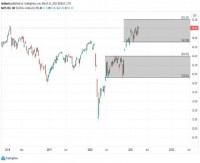|
Trader Vic's Case for Long/Short Indexing Victor Sperandeo, a veteran trader, founder of Alpha Financial Technologies and the author of the “Trader Vic” series of books on trading, has created several successful investable trend-following indexes. A new product, named the Trader Vic Index, is being launched by the Royal Bank of Scotland. What are the pros and cons of index investing in managed futures? We asked Mr. Sperandeo. He, Laurence Black, who heads Thematic Research and Indexes at the RBS, and Fred Magnanimi of Alpha Financial argue that this type of investment has significant advantages. Alpha Financial manages S&P DTI, a long/short commodity and FX Index used in the Rydex Managed Futures Fund, a US Mutual fund, as well as two sub-indexes, one in commodities and the other in FX and US Treasuries. The sub-indexes are the basis of the Direxion Commodity Trends and Direxion Financial Trends mutual funds. “If inflation starts up in a year or so, the indexes will be extremely profitable.” Opalesque Futures Intelligence: What does an investable index mean in the managed futures context? Fred Magnanimi: An index is a basket of futures contracts. The new Trader Vic Index has 24 components spread across physical commodities, global currency and US Treasuries. These are all highly liquid, US traded futures contracts. The idea is go long and short to reflect cyclical trends across these markets. The dislocation in the hedge fund industry benefits this type of product, because investors want the liquidity and transparency indexes provide. OFI: How do current conditions affect index performance? Victor Sperandeo: The equity rally was the big event in March. Commodities and equities are correlated—when equities improve, commodities also tend to improve. Although our index does a great job in providing robust returns over the course of a year, the fact is that passively driven investments do not do as well at turning points. The index adjusts with a lag, so you don't get the big returns we like to see. OFI: So, this was a situation where the index is a disadvantage? VS: Where I had discretion to change positions before the index did, I did anticipate the equity market shift. Our discretionary trading did far better in this rally than passive investments. Stocks had gone down too much. Governments are doing everything they can, throwing the kitchen sink to turn economies around. That caused short sellers to back off a bit and cover the shorts. For those reasons, we bought at the market lows. OFI: Do you change the index components when markets change? VS: We make a point not to change the algorithm. You just get into trouble trying to fiddle with it. If you fiddle with the index because it is not working in the current environment, then it does not work once the environment changes. We developed these concepts in 1999. The first index we created has been in use since 2001 and performed better than the back testing indicated. These indexes are created to be very robust over 12 month periods. OFI: You don't make any adjustments at all? VS: We like to keep things the same for the sake of consistency. But there are events that force us to change the index, as for instance when a gas contract was delisted and we had to substitute another contract for it. If the British pound were to merge with the euro, we'd have to account for that. That's not likely to happen but if it did, we'd have to change the allocation. We have a committee for such emergency changes. FM: What we like about having the same algorithm is that clients can go back in time and model what our strategy does for their portfolio. Because it's the same basket, you can rely on the track record and lack of correlation to major markets. If the trading allocations were a moving target, then the track record would become a less effective way to assess the strategy. So continuing with the same basket adds value. OFI: But what about these periods when investable indexes can't catch up with the market? FM: With the new index, we're going to have two versions. The base index will be fixed but there will be another version where the investment committee will be able to make discretionary changes. The reason for the second version is that in transition periods the index can lag the market, as Victor said. Adding an element of discretion helps when markets change fast. OFI: Who's likely to invest in the new product? Laurence Black: We expect it will appeal widely to three categories of clients, namely sophisticated retail investors who understand the benefits, private banks and their high net worth clients who want to reduce the volatility in their portfolios, and institutions. We have the technology to deliver this strategy in a wide variety of formats. OFI: Does the rest of this year look favorable for futures indexes? VS: Indexing is a lagging process. While very robust over 12-month periods, it is not necessarily robust in any one month. I suspect the upswing will continue and that will benefit passive investments. If inflation starts up in a year or so, the indexes will be extremely profitable. |
|
This article was published in Opalesque Futures Intelligence.
|





 RSS
RSS












